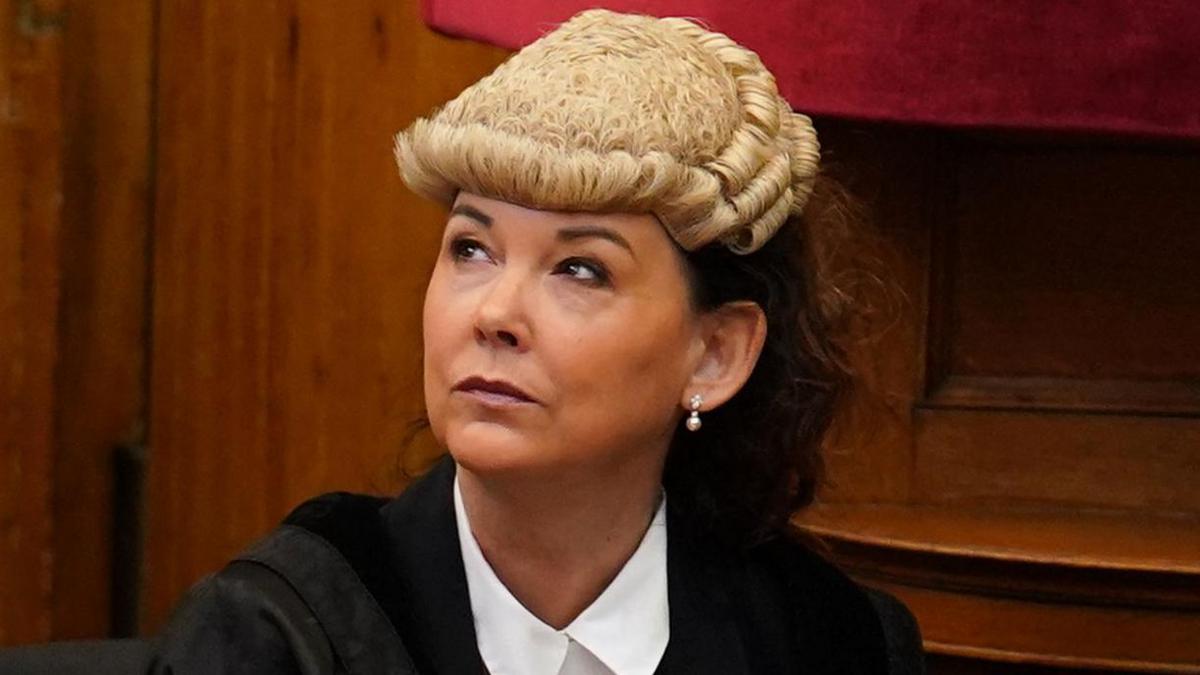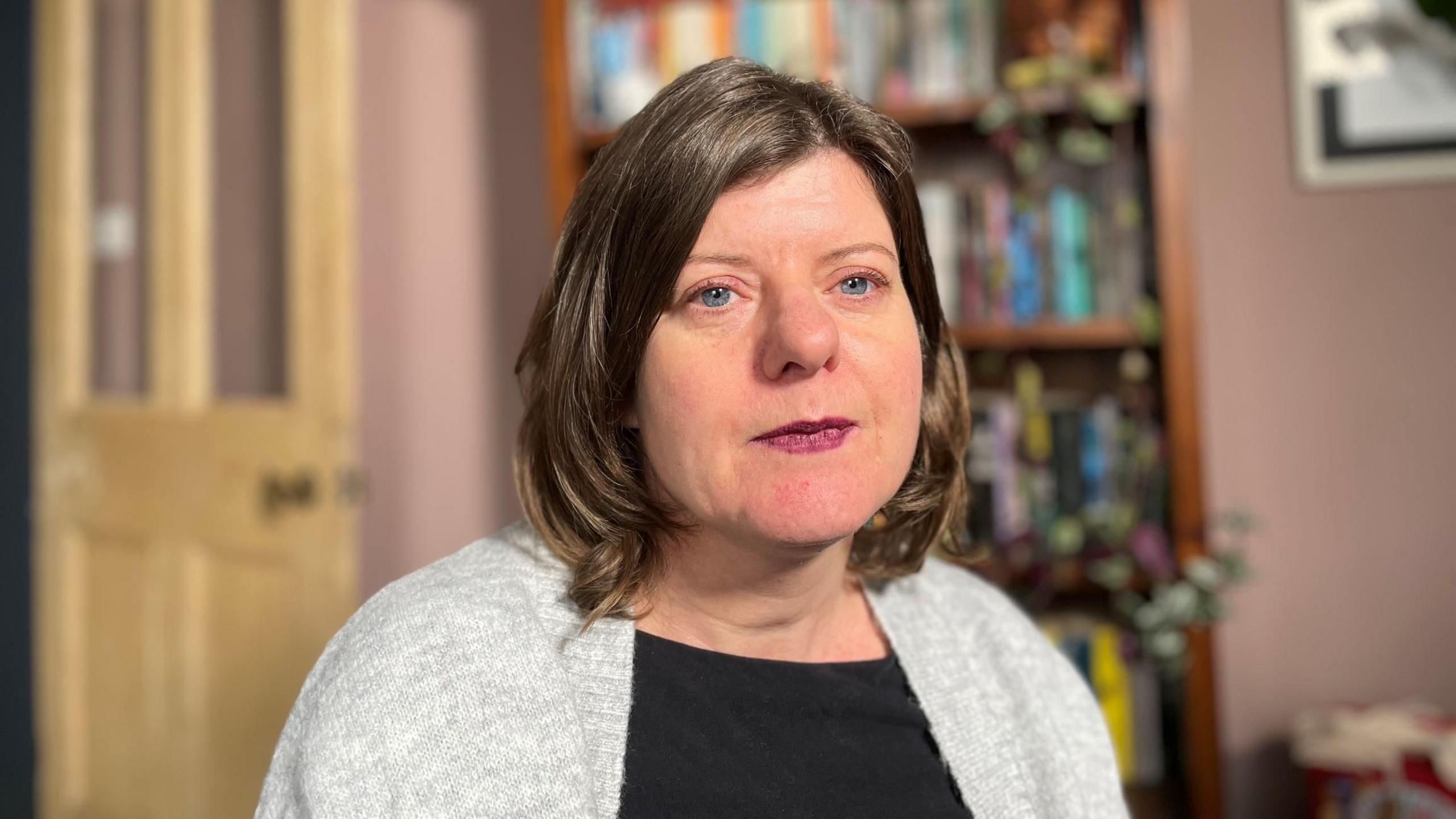Sex case ruling will not harm victims' rights - lord advocate

Scotland's senior law officer Dorothy Bain KC has safeguards for victims will not be affected by the ruling
- Published
Statutory protections for alleged victims giving evidence in sex cases have not been altered by a recent Supreme Court ruling, Scotland's senior law officer has said.
Last week, five judges ruled the courts should change their approach to including evidence about an accuser's character or sexual history.
Following the ruling, Sandy Brindley, chief executive of Rape Crisis Scotland, said the changes could "really could put women off reporting".
But Lord Advocate Dorothy Bain KC said safeguards "remain firmly in place".
She added that the ruling had emphasised "any intrusion into a complainer's privacy must be no more than is necessary to ensure that the accused receives a fair trial".
The lord advocate described sexual abuse inflicted on women and children as "the single greatest challenge our justice system faces".
Judges say Scottish courts are risking right to fair trial in sex cases
- Published6 days ago
She added: "The blame for this lies with those responsible for the perpetration of such brutality.
"It is unacceptable and victims should feel able to speak out without further fear.
"We will continue to balance the fair handling of every case and the protection of victims, in accordance with the evidence, the law and the public interest."
Ms Bain said protections remained in place to protect the "dignity, privacy, and wellbeing of victims throughout the criminal justice process".
She said: "I wish to make clear that every person working on my behalf in prosecuting the perpetrators of sexual abuse and violence will uphold these safeguards robustly so that women and children feel able to give the best evidence they can.
"All of us working within criminal justice share a responsibility and a determination to ensure the rights of all involved are protected."
'Fear of the justice process'
Ms Brindley told BBC Radio's Good Morning Scotland programme: "We've had a number of rape survivors in touch with us expressing concerns about possible appeals.
"This can be extremely anxiety-provoking and distressing for survivors to face.
"These are women, and some men, who have been through a very lengthy justice process, finally able to breathe because their rapist is in prison, only to have to face the prospect of their rapist applying for leave to appeal their conviction."

Sandy Brindley, chief executive of Rape Crisis Scotland said the changes could "really could put women off reporting"
She said it was "crucial" that rape survivors could be confident that the Crown would take a robust approach to defending convictions.
"I don't think any of us want to go back to the days where women are worrying that their private lives and their past history will be fair game in a rape trial," she said.
"It's frequently fear of the justice process that puts women off reporting rape and often women say to us 'I could not bear the thought of my past sexual history being dragged up in court'.
"It absolutely is a deterrent to people coming forward, so I think the lord advocate's intervention is really important where she is setting out really clearly the crown's approach.
"I think there is a lot the Crown can do here to inform survivors and to reassure survivors but also to actively protect survivors' rights."
Katrina Parkes, legal director at the Crown Office and Procurator Fiscal Service (COPFS), sought to reassure victims and said it was "responding swiftly" to developments in case law.
She added: "We have already delivered guidance and training across COPFS, and this has enabled those working on cases to respond.
"The ruling does not automatically render existing convictions unsafe.
"Any appeals would be considered on a case-by-case basis through established review processes."
Ms Parkes said the Crown Office would be "continuously assessing the impact of this judgement upon our work" and would be providing necessary updates to those involved in ongoing cases.
She added: "Access to a fair and humane justice system for all is a priority for all prosecutors, and we do our upmost to uphold these values at all times."
What did the Supreme Court rule?
The Supreme Court had been considering the case of two men, David Daly and Andrew Keir, who were appealing against convictions for rape.
The court dismissed their appeals and said they had received fair trials - but ruled that Scotland's courts should change their approach to the admission of evidence in such cases when it comes to looking at an alleged victim's character or sexual history.
That is expected to result in claims that some cases dating back to 2017 were miscarriages of justice, although it's impossible to say exactly how many will reach the appeal court or whether they will be successful.
Daly and Keir had argued that their right to a fair trial was infringed because they were unable to lead evidence or question the complainers about their credibility or previous sexual behaviour.
While rejecting their appeals, the Supreme Court said the courts had a duty to modify their approach to be compatible with Article 6, external of the European Convention on Human Rights.
The Law Society of Scotland welcomed the judgement but Rape Crisis Scotland described the ruling as "a real step backwards".